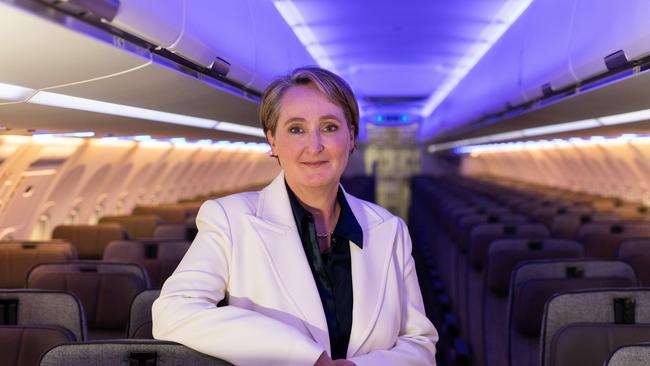As Qantas makes over its ‘dinosaur’ fleet, a new generation of aircraft will help restore status


QantasLink A220s have started the process, providing more seats, a longer range and a 28 per cent fuel saving per seat compared to the Boeing 717s they replaced.
From June, A321XLRs will continue the journey with an added fuel tank allowing Qantas to carry passengers further than they ever have before in a narrow body aircraft.
Then in late 2026, the first of 12 customised A350-1000s is due to touch down, giving Qantas the means to fly passengers almost anywhere in the world from any point in Australia.
As with the A321XLRs, the A350-1000s have their own “winged keel” in the form of a central rear fuel tank, along with a range of special features on board. There’s hi-tech and totally private first class suites, business class seats with a door (albeit 10 years after Qatar Airways did it) and an exercise area for economy passengers.
There’s no question the A350s will give Qantas a competitive advantage as the only airline capable of flying for 20 hours or more with a full payload. Further enhancing that advantage is an exclusivity agreement with Airbus, which means the manufacturer will not replicate the design for any other airline until all 12 A350-1000s are delivered to Qantas.
At the same time, Qantas is embarking on major makeovers for many of its existing aircraft, ripping out the cabins of “younger” 737s to emulate the product on board A321XLRs, and refreshing economy seats on A330s to squeeze a few more years out of the dinosaurs of the Qantas fleet (with an average age of 18.3 years).
Although the refurbishments could be seen as the result of a lack of forward planning by management who left it too long to lodge new aircraft orders, it’s questionable whether moving more quickly would have played to Qantas’s advantage. Take Emirates for example. The luxe Gulf carrier ordered 150 Boeing 777Xs in 2014.
Not one has arrived. Instead Emirates has embarked on a multibillion-dollar refurbishment of existing 777s to try to meet customers’ expectations until the long-awaited new planes land. It’s even had to scrap seats ordered for the 777Xs which are now considered dated, at a further cost to the airline.
Air New Zealand, Ryanair, United Airlines, Alaska and Air India are also feeling the effects of the post-Covid production slowdown, mostly impacting Boeing customers but some of Airbus’s as well.
It might be a much different story had the Covid pandemic not happened in 2020, leading to major disruption in the supply chain, but the fact it did has certainly given Qantas some breathing space.
In another “win” for Qantas, the decision to lodge a huge aircraft order during the pandemic meant considerable cost savings after a bidding war between Boeing and Airbus.
Airbus Asia-Pacific head of communications Sean Lee points out that the Qantas campaign was the only major campaign in that time, as most other airlines simply focused on survival.
Three years on, not only has the ticket price of aircraft skyrocketed, it’s impossible to get a “slot” or delivery date until the early 2030s.
Not that Qantas hasn’t been affected by the global aircraft shortage.
CEO Vanessa Hudson admits she would love to be flying to a whole host of new destinations – if only she had the metal available.
Chicago, Seattle, Las Vegas, Athens and Kuala Lumpur are just a few of the places on her wishlist but there’s little point in making plans until more widebody aircraft do touch down.
It’s a predicament that could easily give rise to a smaller player – Embraer is undoubtedly benefiting from Boeing’s challenges – and then there’s the matter of COMAC, or the Commercial Aircraft Corporation of China.
Could Hudson be tempted to buy from China where domestic aircraft are now in production but generally shrouded in secrecy?
“Right now the order book we’ve got is with Airbus so right now it’s not an option but I think it’s great that there’s more competition coming and we’ll watch how they perform with great interest,” she says.
The author travelled to Hamburg as a guest of Qantas





After years of ridicule for its ageing fleet dominated by geriatric Boeing 737s and elderly A330s, Qantas is on the cusp of a transformation that will help elevate the airline to the forefront of aviation.